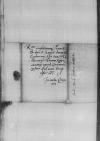Reverendissimo amplissimoque Praesul et Domino, domino ⌊Ioanni Dantisco⌋ Culmensi episcopo, serenissimi et potentissimi ⌊Poloniae regis⌋ oratori apud ⌊caesaream maiestatem⌋, domino meo benignissimo etc.
In aula ⌊caesaris⌋
Salutem, obsequium et commendationem.
Reverendissime, amplissime Domine.
Etsi in summa, qua fungitur pro suo serenissimo ⌊rege⌋ legationis provincia Dignatio Vestra, temperare mihi debebam, ne otiosis meis litteris occupationibus vestris molestiam coniungerem, tamen metienti mihi facilitatem vestram nihil comitti aut peccari putavi, praesertim si meae litterae gratitudinem quandam vestrorum in me collatorum beneficiorum et favoris testarentur, quando sicut nulla tam magna diis immortalibus de rebus omnibus tum sit cura et cogitatio, ut aut supplices mortales, aut gratos pro beneficiis non libenter audiant.
Quare imprimis grates sint immortales, quod Gratia Vestra tanta sua benevolentia affecerit me ⌊Augustae⌋ et illustrissimo ⌊Alberto duci⌋ non mediocriter commendavit in famulitium. Speravi enim non posse non succedere, quod tanto patrocinio commendatum esset, sane ut merita Reverendissimae Dignationis Vestrae superant sua magnitudine, ita facile scio parem me gratiam referre non posse. Manebit tum apud me semper tanti beneficii immortalis memoria capietque, si non alium, Gratia Vestra sui beneficii fructum. Hunc tum, quod in gratum contulerit, et beneficii memorem diis immortalibus pro benignitate hostimentum est animus gratus, quod ex claris hominibus, quos ampliora beneficia contulisse quam accepisse oblectat.
Ceterum, Reverendissime Domine, cum desit ad commendationem scire, quantum valuerit apud illustrissimum ⌊Prussiae ducem⌋ ea commendatio quemque fruc[tum] pepererit, rogo, aut domino ⌊Cornelio Sceppero⌋ scribendum committatis, aut si horae aliquot sunt otiosae et succesivae tantum temporis ad scribendum Dominationi Vestrae suffuretur aut detrahat .
Si illustrissimus ⌊dux⌋ facit condicionem ipse, ad Gratiam Vestram properabo omniaque consilio et voluntate vestra de profectione constituam. Sin nulla est aut non satis liberalis condicio, attamen perpetuo me obstringet tam facilis Gratiae Vestrae animus paratusque, ut et iuvaret, et prodesset.
Commendo mea servitia.

